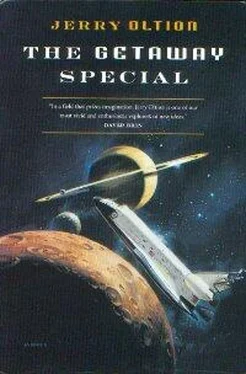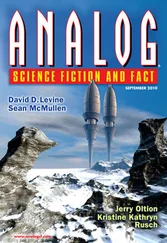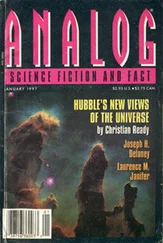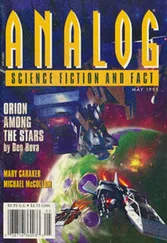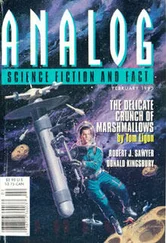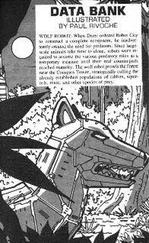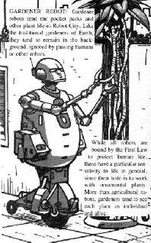Judy felt a shiver run up her spine. “Well you definitely did that. I just hope we can patch things back together before it’s too late. Are you ready there?”
“Ready.”
“Let’s go, then.”
Allen grinned. “Warp speed, Captain,” he said, and pushed the “Jump” button.
Earth suddenly filled the view again. It was at the wrong angle, but just having it there made Judy sigh in relief. She tried the radio again.
“Control, this is Discovery . Do you copy?”
Response came immediately. “ Discovery , this is Control. We copy. What is your status, over?”
“Green bird. Everything is fine. We’ve had a minor, uh, navigational problem, but we’ve got that taken care of. No cause for alarm. What is your status, over?” She realized she was babbling. There would be hell to pay when she got back on the ground, but she didn’t care. Warp speed!
The ground controller wasn’t much better off. “Everything is under control here too,” he said. “Barely. What is the nature of your navigational problem? Over.”
She suddenly realized that she had another big choice to make. Half the world must be listening in on her transmission; should she tell them the truth? Or should she do the military thing and keep it a secret? There were code words for just such a contingency as this.
It was a simple decision, even simpler than the one to return. She said, “Dr. Meisner has just demonstrated what he calls a hyperdrive engine. I believe his description of it to be accurate. We went—”
There was a violent lurch, followed by the beep of Allen’s radio pulse, and the Earth disappeared again.
Judy turned away from the radio to see Allen lifting his finger off the keyboard. “Damn it, I told you not to touch that until I gave the word! Get away from there!”
Allen looked hurt. “I think I just saved our lives,” he said. “Somebody shot at us.” He pointed out the aft windows into the cargo bay, where a cherry-red stump still glowed where the vertical stabilizer had been. Hydraulic fluid bubbled out into vacuum from the severed lines.
Judy took it all in, in less than a second, then whirled and kicked herself forward between the commander’s and the pilot’s chairs to look at the fuel pressure gauges. They remained steady, but the hydraulics and the auxiliary power units that drove them were both losing pressure fast. It hardly mattered, though; both systems were used only during launch and descent, and there could be no descent without a vertical stabilizer.
She shut off the alarms and clung to the command chair for support. “That was stupid,” she said. “Of course the laser satellites would fire on something that suddenly pops into orbit where it doesn’t belong. Damn it! Now there really is going to be a war.” She turned around to face Allen. “Take us back again, but this time put us short of the Earth. I don’t want to go into orbit; I just want to be in radio range.”
Allen hesitated. “I—I don’t think we should—”
“Do it! The end of the world is about fifteen minutes away. I don’t care what it takes, just get us within radio range. And outside laser range.”
Allen nodded.
While he punched numbers on his keyboard, Judy tried to compose what she was going to say. She wouldn’t report the damage yet, not until she was sure everybody had their fingers off of the missile launch buttons. Ground control would know by their telemetry that something was wrong, but they wouldn’t know how it happened, and the military would know that the Russians or the French or the Chinese had fired an A-sat weapon, but they wouldn’t know at what. Or—she had a sudden thought. Who said it had to be an enemy A-sat? It had to have been an automatic shot; that made it a fair chance that it was an American beam.
It hardly mattered. Either way, it would mean war if she didn’t explain what had happened.
Allen looked over at her and said, “I’ve cut the radial distance by one percent. I don’t know where that will put us, but it should at least be out of Earth orbit.”
Judy nodded. “Okay. Do it.” She turned to the radio.
The hyperdrive did its trick again, but the Earth didn’t fill the view. In fact it took Judy a moment to find it: a gibbous blob of white reminiscent of Venus seen through a cheap telescope. At least she supposed that was Earth. A bright point of light that might have shown a disk if she squinted had to be the Moon beside it. They were too close together, though, or so she thought until she remembered that the Moon could be between the ship and Earth, or on the other side of it, and the apparent distance would be shorter than it really was.
She shook her head. “Too far,” she said. “We’d never make ourselves heard from this distance. You’ll have to take us closer.”
Allen was starting to sweat. “Look,” he said. “I can’t keep moving us around without calibrating this thing. Every time we jump we’re compounding our error, and we get farther and farther from knowing where we are.”
“I know exactly where we are,” Judy said. “We’re too far for radio communications. Take us closer.” She waited about two seconds while Allen hesitated, then added, “Now.”
“All right,” he said. He tried to throw his hands up in a shrug, but he overbalanced and had to grab on to the overhead panel to steady himself. He pulled himself down again and began to work with the keyboard.
Judy heard the radio pulse and the view changed again. Earth was larger, about the size that it would be when seen from the Moon, though it showed only a crescent now. She didn’t see the Moon out the front windows, but when she looked back through the cargo bay windows she found it. It was bigger than the Earth. Much bigger. They couldn’t have been more than a couple thousand miles from it. She watched the surface for a few seconds, trying to determine their relative motion. Was it getting closer? She couldn’t tell.
All the same, as she plugged her headset into the radio she said, “Get ready to move us again.” This time Allen didn’t argue.
“Control, this is Discovery , do you copy?”
She had forgotten about the time lag. She was about to call again when she heard, “Roger Discovery , we copy, but your signal is weak and you have disappeared from our radar. What’s happening up there?”
“We’re not in orbit any longer. Doctor Meisner’s experiment has moved us to the general vicinity of the Moon. I repeat, Doctor Meisner’s experiment is responsible for our change in position. There is no cause for alarm. Do you copy?”
A pause. “We copy, Discovery . No cause for alarm. You bet. We’ll tell the President to get his finger off the button, then. Hold on a second—uh…” The timbre of Control’s voice changed, and Judy realized he was reading. Someone had evidently handed him a note. He read: “Due to a state of national emergency, the Pentagon has taken control of this mission. You are now a military flight. Any information concerning the nature of Doctor Meisner’s experiment is now classified top secret. Do you copy?”
Judy had been expecting that. She laughed into the microphone and said, “Don’t tell the world that we’ve got hyperdrive? You know where you can tell them to put it, Control. Kindly remind the idiots at the Pentagon that I am a civilian pilot, and that my loyalty goes to humanity first, nation second. What they request is tantamount to suppressing knowledge of the wheel, so you can tell the Pentagon to stuff it deep, over.”
Judy saw motion out of the corner of her eye and turned to see Allen applauding silently. He said, “I sent e—”
Judy held up her hand to quiet him as Mission Control responded. She could hear the cheering in the background. “Roger, Discovery . We copy and concur. Your, ah, hyperspace jump seems to have messed with the telemetry. We’re getting low pressure readings in the hydraulics and APUs. Do you confirm, over?”
Читать дальше
